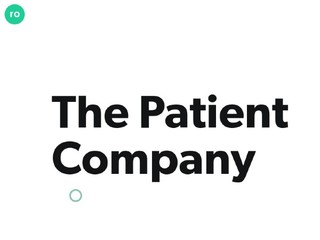Omair Ansari, CEO of Abhi, on the Vator Innovation Podcast
Abhi provides working capital to SMEs and earned wage access to employees
Read more... Last week, direct-to-patient healthcare company Ro announced an agreement with the National Institute on Aging, part of the National Institutes of Health, to create the "Registry for Equal Access to Clinical Trials in Alzheimer’s Disease."
Last week, direct-to-patient healthcare company Ro announced an agreement with the National Institute on Aging, part of the National Institutes of Health, to create the "Registry for Equal Access to Clinical Trials in Alzheimer’s Disease."
Ro will help identify potential patients who could participate in trials, using its telehealth platform to screen and recruit patients who may be at an elevated risk for the disease to join a registry of potential participants in NIA-conducted and funded clinical trials.
The goal is to also use Ro's technology to diversify recruitment. Every step of recruitment, screening, and assessment can be completed over telemedicine, meaning it can be done in the comfort of patients’ homes and scheduled at their convenience.
Lauren Broffman, PhD, Ro's Director of Clinical Research, spoke to VatorNews about the issues with Alzheimer's clinical trials, why Ro is uniquely qualified to help, and the benefits of public-private partnerships in healthcare.
VatorNews: What specifically makes it difficult to recruit patients for Alzheimer's clinical trials? What are the unique factors that are a hindrance?
Lauren Broffman: Clinical trials have long struggled to enroll participants that are representative of the population affected by the conditions being studied. This problem is especially consequential for a disease like Alzheimer’s Disease, which racial and ethnic minorities have a higher risk of developing. Challenges with trial recruitment are not dissimilar from those that patients face throughout the healthcare system: gaps in education about trials, access to the researchers conducting them, and the burden of frequent trips to a research center or clinic.
VN: Why is Ro uniquely positioned to help with that? What data or access do you have that others do not?
LB: Ro is uniquely able to help with recruitment for Alzheimer’s Disease research and other clinical trials due to the capabilities of our direct-to-patient platform and the diverse, nationwide patient population we serve. Ro’s platform is built to make patients’ health journeys as easy and convenient as possible – and it can help to do the same for clinical research. Ro can use the power of our platform to conduct outreach to and remotely screen potentially eligible patients for Alzheimer’s Disease trials – helping remove the complexity and burden on patients throughout this screening process.
VN: Besides being at risk for Alzheimer's disease, what other factors would make a person a good fit for this registry?
LB: Ro’s initiative with the NIA is focused on both making it easier for patients to participate in clinical research, and diversifying the population of patients who do enroll in trials. To this end, we are working with our partners to prioritize screening of patients traditionally underrepresented in Alzheimer’s Disease research.
VN: Once patients are on the registry, what happens? Are they contacted to participate in clinical trials? And where does Ro fit into that going forward?
LB: After completing the initial survey and cognitive assessment, patients may be contacted by the NIA to continue through a second screening phase, which would involve genotyping. Should this initial collaborative study prove successful, both organizations hope to explore the possibility of Ro delivering at-home testing kits directly to patients to collect and analyze blood samples for the presence of the APoE4 gene, an Alzheimer’s Disease susceptibility indicator. Eligible patients who join the registry will have the opportunity to participate in future Alzheimer’s Disease clinical trials conducted by the NIA.
VN: Is helping to recruit patients for clinical trials something that Ro does often? Is that already a part of your platform, or is this something new for you?
LB: This is Ro’s first initiative in the clinical trials space, but it demonstrates the power of our platform to be adaptive and flexible in how it can be used to best support our patients. We believe that our platform has real potential in this partnership to connect patients and researchers in the most effective and convenient manner possible. Ro will continue to evaluate opportunities to expand our support of clinical research and trials, whether through public-private partnerships like this or otherwise.
VN: What is your ultimate goal with this partnership with NIA? What would be success for you?
LB: Ro’s ultimate goal is to help the NIA identify and recruit eligible patients for the registry, so that they have a deep and diverse group of patients with which to conduct their hundreds of Alzheimer’s Disease trials. We are proud to be a part of these crucial efforts and see this is another example demonstrating what Ro and our platform can do to innovate on behalf of patients.
VN: Is there anything else I should know?
LB: Ro believes that public-private partnerships play a critical role in accelerating medical advancement and improving overall health. We previously partnered with New York State to administer in-home Covid-19 vaccines to home-bound and vulnerable seniors in the early days of their availability when they were difficult to access. We are looking forward to continuing our work with government entities to combine knowledge, expertise, and technical capabilities in the interest of enhancing public and population health.
Abhi provides working capital to SMEs and earned wage access to employees
Read more...Northstar democratizes wealth management for employees
Read more...Murad was appointed last week, succeeding founding CEO Stephanie Tilenius
Read more...